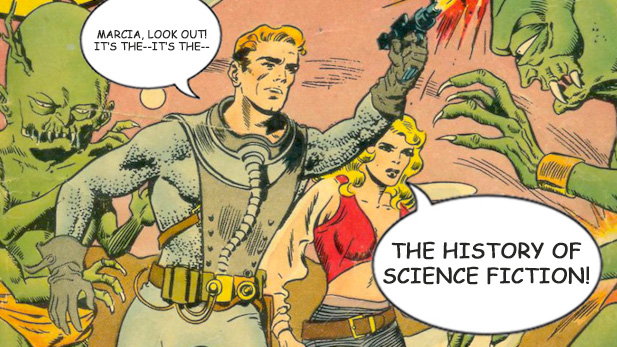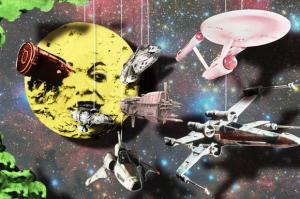Listen, Liberal -
Or, What Ever Happened to the Party of the People?
|
Sunday, 15 January 2017
quote [ I liked the special effects, but I really loved the ideas and the questions behind them: How will the world end? Will technology destroy us? What does it mean to be human? These are subjects sci-fi has never been afraid to tackle. - James Cameron ]
Someone else's comment: "I love that Jim will focus on the big QUESTIONS other fiction often avoids. We do not need another chronology of SF authors, no point to that."
|
Comments
|
HP Lovekraftwerk said @ 6:03pm GMT on 15th Jan
Regarding the thumbnail, I take issue with Star Wars being referred to as "science fiction." At best, it's fantasy.
|
|
Ankylosaur said @ 6:07pm GMT on 15th Jan
Le Voyage dans la Lune is hard sci-fi?
|
|
HP Lovekraftwerk said @ 6:53pm GMT on 15th Jan
It was inspired by Jules Verne (considered a sci-fi writer of his age), but I'd have to defer to what was known about the moon at the time. From what I can find, it was only about 30 years prior to this film that the craters on the moon were reasoned to be from impacts and not the result of volcanoes.
|
|
sanepride said @ 6:17pm GMT on 15th Jan
I get your point, but it's not such an easy line to draw. Most 'science fiction' is really just some parable of human experience or mythology. Would you consider 'Dune' science fiction? Like Star Wars, it's basically just fantasy/mythology in a sci-fi setting.
|
|
HP Lovekraftwerk said @ 7:11pm GMT on 15th Jan
I also see your point, but Star Wars started out as just a hero's journey and special effects extravaganza. Everything that has been added to the Star Wars tar-ball has never cared about the effects of its own tropes on the society of Star Wars, the development of cultures, etc. It's just "we have space-wizards, and a lot of times they fight and blow stuff up." I'm not saying it's not entertaining, but it says so very little about anything. You could swap out the Jedi with wizards and not change much. In fact, they kind of did, and the result was "Willow."
"Dune" at least took a macguffin (the Spice) and tried to extrapolate where that would take humanity when they had access to something that would alter their consciousness and evolution. There were additional topics as well, like why you had Mentats and no robots. I'll also admit that I only read the first two Dune novels and I understand things went rapidly downhill with all the sequels, so taken as a whole, your mileage may vary. Compare and contrast Star Trek and the current JJ Abrams movies: One tries to look at humanity confronting the unknown and the other just wants to blow fantastic-looking shit up. In the latest film, that starbase they had that was large enough for the Enterprise to fly inside of it put the series 100% into the space-fantasy category. |
|
zarathustra said @ 8:43pm GMT on 15th Jan
[Score:1 Interesting]
Yeast ago, I too a writing class in summer school and they had a bout ten sections all focusing on a genera. I took science fiction. The professor was Ben Bova. The definition he gave was, paraphrased, "if you removed the science element could you even tell the story." The plot of Star Wars is in no way dependent on any of the gizmo's in it. You would tell the same story using ocean going ships. The sciency stuff is nothing but a setting. Applying such an analysis to Star Trek you would find that some is and some isn't. For example A Taste of Armageddon couldn't be told without computers fighting the war since it it the main issue. Balance of Terror, on the other hand, is simply the WWII film The Enemy Below IN SPACE ( duh, duh, duh). Something like Dune has elements of both. I'm not a hundred percent satisfied with the definition, but I think it is better than most.
|
|
knumbknutz said @ 8:55pm GMT on 15th Jan
One of the things that Bova said that most stuck with me, was successful science fiction writing is (paraphrasing) less about the science and extrapolation, and more about making each chapter and plot that needs solved, by splitting said chapter into several subplots that need to be solved on their own.
|
|
midden said[1] @ 1:41am GMT on 16th Jan
"Yeast ago I too a writing class in summer school..."
hehe |
|
zarathustra said @ 2:06am GMT on 16th Jan
:) The curse of not proof reading is still strong in me.
|
|
HoZay said @ 7:56am GMT on 16th Jan
It was a writing class, not an editing class.
|
|
zarathustra said @ 9:10am GMT on 16th Jan
I don't need your pity ( sob) ..
|
|
knumbknutz said @ 9:08pm GMT on 15th Jan
[Score:1 Interesting]
This probably belongs in the SE book club, but - I know the spice sounds like a macguffin, but I believe the whole DUNE series was written originally as a cautionary tale about what happens to a society when it gets dependent on a single resource, bunched up in a single location.
It was written in 1965, when Americans were starting to get utterly dependent on oil as a primary means of power and the base of the economy, and right when they were just starting to discover all those elephant sized fields in the ME (desert people, Arrakis, brutal dictatorships and proxy-wars getting set up in ME countries, power struggles between differing "super-factions," etc.) So pretty much, the spice isn't really the hook - it's the entire basis of the series and the reason the books were written. From the looks of the world today, he wasn't too far off either. |
|
zarathustra said @ 9:29pm GMT on 15th Jan
Allegories IN SPACE ( duh, duh, duh.) That would cover a lot social science fiction and about half of Star Trek.
|
|
HP Lovekraftwerk said @ 9:44pm GMT on 15th Jan
I thought the Spice = oil was obvious, so I didn't bring it up. Arrakis = the Middle East is also fairly bald-faced, as is the Houses (Western powers) dominating the natives to take a resource an analogy that sits on your head and hits you with a hammer.
It's still a plot-driving macguffin any way you slice it. |
|
midden said @ 1:27am GMT on 16th Jan
I first read Dune when I was 11 or 12 in the early 80s and completely missed the obvious middle-east allegory. I knew about the long gas lines and such, but had no understanding of geopolitics and economics. I read it again in college and was hit right between the eyes with it.
|
|
midden said @ 1:40am GMT on 16th Jan
Same goes with many sci-fi monster movies. It doesn't usually matter that they are aliens. Just look at all the zombie movies that are framed with some kind of scientific explanation. The science part is usually just a way to give an old idea a more modern context. I'm not saying there's anything wrong with that.
How about Inception? Not really science fiction, just a sciency justification for dream-walking in other people's heads. District 9? Could be any apartheid/immigrant population. Fury Road? Snowpiercer? Solaris? Minority Report? |
|
sanepride said @ 3:46am GMT on 16th Jan
Right, that's kind of my point, sci-fi is more often just the vehicle, not the destination.
But of all the examples you cite, 'Solaris' is pretty close to 'pure' sci-fi. Never saw the remake, but the book and original Russian movie are masterworks of the genre. |
|
midden said @ 5:08am GMT on 16th Jan
Yes, I was just expanding on your point. I don't see much science in Solaris, though. It could just as easily have been sorcery on a remote island as a planet-wide alien intelligence in a space station. I've read the book and seen both movies, but honestly, they have become pretty entangled in my memory at this point.
|
|
sanepride said @ 5:36am GMT on 16th Jan
I think you're taking the term 'science fiction' too literally. It doesn't really have to be about or of actual science (thought that's usually a plus). I see better, purer science fiction as telling a story that strives to transcend contemporary human experience, rather than just reframe it.
|
|
midden said @ 7:00am GMT on 16th Jan
Hmm, I think with that definition, the Bhagavad Gita and the Ramayana would qualify as "science fiction." I think good science fiction not only strives to transcend contemporary human experience, but explores and clarifies current human experience by testing it in a plausible future. That future is plausible because it is based on a reasonable extension of current technological progress.
|
|
HoZay said[1] @ 8:13am GMT on 16th Jan
Jurassic Park is good science fiction to me, because there's real science at the core of the plot, and the story just wouldn't exist without it.
On the other hand, I was surprised to discover Vonnegut was considered SF. |
|
midden said @ 1:18am GMT on 16th Jan
It was just more interesting than the shot of Cameron standing in front of a black background that was in the article. I almost used this one:
 |
|
arrowhen said @ 4:35am GMT on 16th Jan
|
|
maximumtodd said @ 8:28pm GMT on 15th Jan
Although Star Trek was pitched as the Wagon Train to the stars, it had plenty of social commentary that would put it in a different category than Star Wars. Star Trek is set in the future and did a better job at being more realistic and explaining their science than Star Wars. Star Wars was set in the past and as a result had more freedom to pursue a more fantasy realm. All being said, I've enjoyed both and can't believe I allowed myself to get sucked into this discussion.
|
Post a comment
[note: if you are replying to a specific comment,
then click the reply link on that comment instead]You must be logged in to comment on posts.

